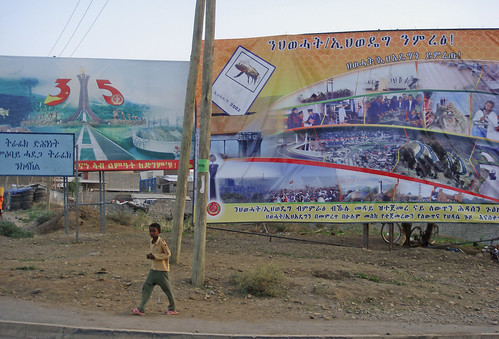
An EPRDF billboard. Creative commons licensed Flickr content.
A representative of the media asked me to comment on very short notice on the Human Rights Watch report on Ethiopia and the conclusion that foreign aid contributes directly to political repression in the country. I am posting my tentative response based solely on having read the summary of a 100 plus page report.
The Human Rights Watch (HRW) report is very long; I can't take time to read all of it at the moment. I will make a few comments based only on a reading of the summary.
I am not in a position to question the accuracy of HRW's research. It usually does a pretty good job. You can certainly make the case for repression and EPRDF efforts to marginalize the political opposition.
Based solely on the summary, the HRW report is less persuasive in making the link between development assistance and political repression. Unless the study breaks down development aid from humanitarian assistance, it may be something of a false argument. The vast majority of U.S. aid to Ethiopia consists of food aid and assistance to combat HIV/AIDS, malaria and TB.
This is NOT development assistance. Other donors may provide a higher proportion of their assistance in the form of development aid. Certainly, most World Bank aid is for development. I still suspect HRW is being a little too loose in making the link between development aid and political repression.
The summary says "the government has used donor-supported programs, salaries and training opportunities as political weapons to control the population, punish dissent, and undermine political opponents." Does the report say what percent of total aid is used for this purpose? I suspect it does not and suspect it is a tiny percentage of total assistance.
It is true that Ethiopia is high on the list for receiving donor aid. It is also one of the poorest and at 81 million people most populous developing countries in the world. The only fair way to look at aid figures is on a per capita basis. If you do so, for example, you will find that in 2008 Eritrea received $29 per capita in foreign assistance as compared to $41 for Ethiopia -- not a huge difference.
There is plenty to criticize on the human rights front in Ethiopia. It is equally important, however, to put the situation in context. I am not sure HRW has done that.



